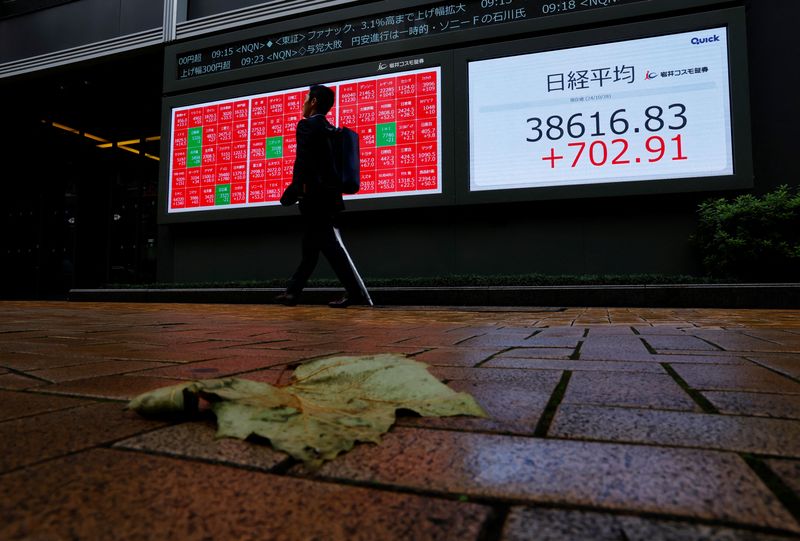By Brigid Riley and Kevin Buckland
TOKYO (Reuters) -Japanese stocks rose strongly on Monday as the yen careened to a three-month low after Prime Minister Shigeru Ishiba’s coalition lost its parliamentary majority in a drubbing in Sunday’s election, raising uncertainty over the path for policy and the economy.
Ishiba’s Liberal Democratic Party (LDP), which has ruled Japan for almost all of its post-war history, and junior coalition partner Komeito took 215 seats in the lower house of parliament, short of the 233 needed for a majority. The LDP previously held 247 seats and Komeito held 32.
The outcome may force parties into fractious power-sharing deals to rule, potentially ushering in political instability.
The share average rose 1.45% to 38,463.50 as of the midday recess, and was earlier up nearly 2%. It opened 0.4% lower.
The yen accelerated declines throughout the session, slumping as far as 153.885 per dollar for the first time since July 31. It was changing hands about 0.8% weaker at 153.60 per dollar as of 0230 GMT.
“The result of the election itself is a negative for the stock market, without a doubt, because of the rise in political uncertainty,” said Masahiro Ichikawa, chief market strategist at Sumitomo Mitsui (NYSE:) DS Asset Management.
“However, the rally is partly on the fact that this big risk event is now behind us, so there’s a sense of relief. That and the weaker yen.”
A weaker currency benefits Japan’s heavyweight exporters, as it inflates the value of overseas sales. It also makes Japanese stocks cheaper for foreign investors.
The transport equipment sector was the best performer among the Tokyo Stock Exchange’s 33 industry groups, jumping more than 3%. Toyota (NYSE:) rallied nearly 4% and Nissan (OTC:) climbed 3.3%.
Chip-sector stocks also outperformed, tracking gains among U.S. peers from Friday. Chip-testing equipment maker Advantest was the Nikkei’s biggest points gainer with a 4.7% surge.
“I don’t expect the rally will continue,” said Norihiro Yamaguchi, senior Japan economist at Oxford Economics.
“The equity market is likely to stay lacklustre till the political uncertainty clears up,” he said. “I would expect bond yields to stay high as concern over looser fiscal management will intensify.”
Benchmark 10-year Japanese government bond futures fell 0.11 yen to 143.95 yen, reversing an earlier rise.
The yield curve steepened, with the five-year JGB yield rising 0.5 basis points (bps) to 0.58%, while the 30-year yield gained 4.5 bps to 2.215%.
The 10-year yield added 1.5 bps to 0.96%.
The election result drew market attention to the policy stance of opposition parties that could become potential partners, many of which favour low interest rates. Markets could also price in more aggressive government spending.
Coalition losses could reduce the chance the next government will implement “more challenging agenda items such as hiking the corporate tax rate”, analysts at Morgan Stanley said in a note.

Analysts at BNY said the dollar could potentially rise to 155 yen again, as the BOJ downplays the immediate need for a rate increase. The central bank next decides policy on Thursday, with no change expected.
Japan’s general election comes nine days before votes are counted in the closely contested U.S. presidential race, with investors weighing the possibility of a bullish dollar and higher yields in the event of another Donald Trump presidency and Republican sweep of the Senate and House of Representatives.
(Reporting and writing by Brigid Riley and Kevin Buckland in Tokyo; Additional reporting by Vidya Ranganathan in Singapore; Editing by William Mallard and Lisa Shumaker)